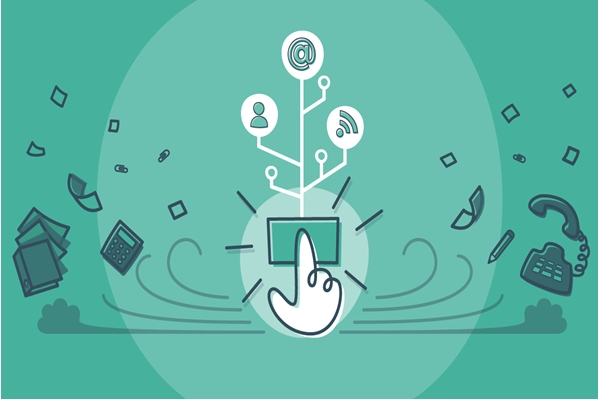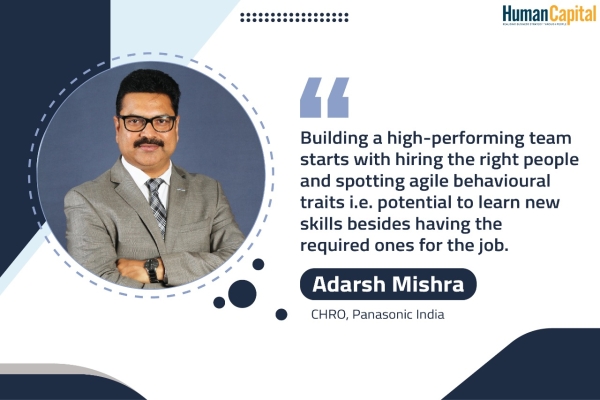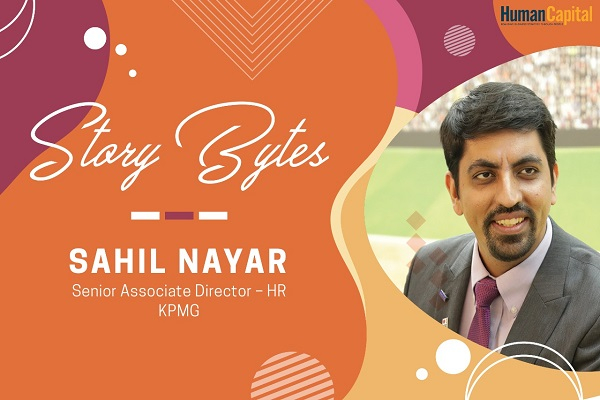Digitalization is a storm that's brewing, and organizations will need the right talent to survive this storm.
One of the most quoted predictions around the future of jobs anticipates that two in three children starting school today will work in professional roles that are yet to be created. Exponential transformation in the nature of business and advancement in the digital space are expected to be the major contributors to this change. So, what exactly is digital transformation, and why is it essential to success-proof it?
In the current scenario, digitalization is bringing about a change in our perspective toward work and how we function. If we look around, successful digital businesses today share common traits of focusing more on customers. They operate efficiently and quickly, and are incredibly responsive. These agile organizations create insights that open newer avenues for operation. Keeping this in mind, all organizations are striving for innovation in day-to-day operations. The markets, too, are continuously evolving, and we are gradually coming to terms with the fact that adapting to the speed of the digital transformation is the only way to stay relevant. Without digitalization, there is a strong possibility that we will no longer be relevant or competitive. This makes large-scale digital transformation inevitable So, let’s agree that digitalization is a storm that’s brewing, and organizations will need the right talent to survive this storm. This is where the problem lies for most companies as, on one side, there is an exploding skills gap, while on the other, there is a need for jobs. Albeit, the story of the skill gap is not a new one but rather a familiar one. Today, skills security, as a concept, is eroding more rapidly than ever. Skills that were relevant two years back may not be as crucial now. The demand is to continuously develop a highlyskilled workforce for organizations. Today, the traditional working pattern of one employee and a single job is becoming obsolete. It is being replaced by new types of collaboration that are more digital and customer-oriented. Increasingly, work is no longer a place wherein the employee is expected to go to the same office, at the same time, to log in at the same geographical location. It is transformed into working remotely, in a convenient time zone, and from anywhere in the world.
How do we accelerate the adoption of new-age skills in an ever-changing world?
Society 5.0
According to Global Japan, Japan’s vision for the future is that society 5.0 will be a super-smart society where every industry and all segments will have been impacted by technologies, such as artificial intelligence (AI), Internet of Things (IoT), and robots. The World Economic Forum also anticipates that Society 5.0 will be a futuristic society in which sustainable development will occur due to the creativity of diverse people who will utilize digital skills for problem solving and value creation. Japan’s way of addressing and adopting new-age skills is an early step. The country is doing this by redefining its education standards and preparing for the future. It is aimed and expected to reduce the digital skill gap.
Image Source: Nakanishi, H. (2019). Modern society has reached its limits. Society 5.0 will liberate us. [online] World Economic Forum.
Geographical Disparities
With STEM (Science, Technology, Engineering, and Mathematics) and ABCD (AI, Blockchain, Cloud, and Datamatics) on the rise, not all countries today have the ability to address the growing talent demands. While the US is a powerhouse, it is unable to fill all jobs due to the lower number of STEM graduates compared to other countries like India. As a result, countries with vast talents such as India contribute to the largest offshore centers and will continue to do so. This rapid change has resulted in the rise of developing countries that is propelled further by the growth of infrastructure to address present as well as future needs. Such global disparities are evident today, and countries will have to make crucial decisions to fill the gap between supply and demand.
Global organizations should develop their go-to-market strategies and further blur the boundaries of doing business and developing talent.
Creative Thinking
So what is the most important digital skill? Obviously, it is not related to a specific device or software. We see that many occupations have a considerable percentage of tasks that can be automated. As technology is everchanging and evolving, past winners are quickly forgotten and replaced by something better. Therefore, the most important survival skill for any organization or employee in the face of transformation is creative thinking. It demands the ability to learn, unlearn, and relearn quickly. To ensure the longevity of a workforce and oneself, people must be able to do what machines are unable to do.
Development of a Recombinant Digital DNA
Digitalization doesn’t necessarily mean going online. It means that you have to be open to newer ways of using technology and changes in ways of living to adapt to changing human needs. Keeping an open mind on change adaption is essential. One should look at being early adopters of technology, learn fast, fail fast, and let others know. The technology can be anything that’s relevant to the business. Most technologies that we see today are just the tip of the iceberg compared to the speed at which we are making advancements in technology. Companies need to engage with other ecosystems that could be even their competitors, partners who are big or small, and employees who are working fulltime or as consultants. All of them should come together for a larger purpose, which is to provide a winning solution for all. Critically, organizations should align their employees with the long-term digital strategy and build digital DNA.
To summarize, let’s understand that machines clearly can never replace humans. For thousands of years, it has always been humans and human values that have won. It isn’t easy to develop any skill overnight. It is vital human qualities such as courage, judgment, patience, and interpersonal skills that make the difference. We have to learn, explore, and embrace the unending possibilities.
References:
http://www3.weforum.org/docs/ WEF_Future_of_Jobs.pdf
https://www.hitachi.com/rev/archive/ 2017/r2017_06/trends/index.html
https://www.weforum.org/agenda/ 2019/01/modern-society-has-reachedits-limits-society-5-0-will-liberate-us/
https://www.i-scoop.eu/industry-4-0- society-5-0/
Has COVID-19 forever changed the way we live and work?
Trending
-
SBI General Insurance Launches Digital Health Campaign
-
CredR Rolls Out 'Life Happens' Leave For Its Employees
-
Meesho Announces 30-Week Gender-Neutral Parental Leave Policy
-
Microsoft Unveils Tech Resilience Curriculum To Foster An Inclusive Future
-
60% Indian Professionals Looking For Job Change Due To COVID: Survey
-
SpringPeople And Siemens Collaborate For Digital Transformation Push
-
86% Professionals Believe Hybrid Work Is Essential For Work Life Balance: Report
-
Almost 1 In Every 3 People's Personal Life Affected Due To Work Stress
-
Meesho Rolls Out Reset And Recharge Policy For Employees
-
80% Of Talent Leaders & Academics Say Pandemic Changed Skill Needs For Youth: Report
-
Hero Electric Rolls Out 'Hero Care' Program For Employees
-
Human Capital In Collaboration With ASSOCHAM Hosts Virtual Conference
-
IKEA India, Tata STRIVE Collaborate To Create Employability And Entrepreneurship Opportunities
-
SAP India, Microsoft Launch Tech Skilling Program for Young Women
-
DXC Technology, NASSCOM Collaborate For Employability Skills Program
-
Lenskart To Hire Over 2000 Employees Across India By 2022
-
Mindtree Launches Learn-and-Earn Program
-
Tata AIA Extends 'Raksha Ka Teeka' To Its Employees
-
Swadesh Behera Is The New CPO Of Titan
-
NetConnect Global Plans To Recruit 5000 Tech Professionals In India
-
Hubhopper Plans To Hire 60% Of Indian Podcasters By 2022
-
Corporate India Needs More Women In Leadership Roles: Report
-
Aon to Invest $30 Million and Create 10,000 Apprenticeships by 2030
-
Tech Mahindra Launches ‘Gift a Career’ Initiative for Upskilling of Youth
-
40% Women Prefer Flexible Working Options in Post-COVID World: Survey
-
3 out of 4 companies believe they can effectively hire employees virtually: Report
-
Vodafone , CGI and NASSCOM Foundation launch digital skills platform
-
Odisha: Bank, postal employees to deliver cash for elderly, differently-abled persons
-
Skill India launches AI-based digital platform for "Skilled Workforce"
-
Hiring activity declines 6.73% in first quarter: Survey
-
70% startups impacted by COVID-19 pandemic
-
Bajaj Allianz Life ropes in Santanu Banerjee as CHRO
-
Over 70 Percent MSMEs look at cutting jobs to sustain businesses
-
93 Per Cent employees stressed about returning to office post-lockdown
-
Johnson & Johnson India announces family benefits for same gender partners
-
Indian firms turning friendly towards working mothers
-
Welspun India names Rajendra Mehta as new CHRO
-
Wipro partners with NASSCOM to launch Future Skills platform



Human Capital is niche media organisation for HR and Corporate. Our aim is to create an outstanding user experience for all our clients, readers, employers and employees through inspiring, industry-leading content pieces in the form of case studies, analysis, expert reports, authored articles and blogs. We cover topics such as talent acquisition, learning and development, diversity and inclusion, leadership, compensation, recruitment and many more.
Subscribe Now














































Comment